- Home
- Tim Winton
The Riders Page 27
The Riders Read online
Page 27
• • •
BILLIE SAW HIM COME OUT handcuffed and bellowing like the Hunchback on the Feast of Fools, blurred by her crying. The crowd shivered with excitement and made way. They didn’t know him. They thought they did but they had no idea. The van flashed and someone touched her on the shoulder and she climbed in front to the smell of cigars and disinfectant. The doors slammed. The police talked their bird language. In the back, behind the glass, he was laughing. Someone, the driver, passed her a hanky.
‘You know him?’ someone asked.
Billie thought about it. She smelled the sweet soapy smell of the hanky and licked her lips. The narrow streets flashed by.
‘Yes,’ she said, without her voice breaking. ‘He’s my father.’
Fifty
SCULLY WOKE WITH A HORRIBLE, head-shattering start and immediately felt the raw bitterness of his throat. His face was hot. The vinyl mattress squawked under him as he sat up in the bare cube of a room. A key gnawed like a rat in its hole and the big door swung open with its sliding window agape. Shee-it! He scrambled sluggishly to his knees, trying to catch up.
‘Billie?’
A woman in a rumpled corduroy suit and a bowl of ash- blonde hair stepped cautiously in. Behind her hovered a bloke in uniform. His moustache was downy on his firm pink face. So where was Billie? Oh God, oh God!
‘Hello?’ said the woman. She was thin and handsome. In her forties, maybe. It seemed she had just climbed out of bed. Her eyes were red. ‘You speak English, huh?’
Scully nodded gingerly, not liking this set-up at all. Billie!
‘My name is Van Loon. I am a doctor.’
Scully nodded. He was still on his knees before her. The door closed a little way.
‘Does your . . . head hurt?’
He put a hand to the side of his head and twitched.
‘Dildo,’ he murmured, remembering.
The quack wrote something in a notebook.
‘They say you are upset,’ she said. ‘You are laughing.’
Scully looked at her questioningly.
‘Two hours you are laughing.’
By the feel of his throat it didn’t surprise him.
‘What is your name, please?’
‘Anne Frank,’ he said looking around the cell. ‘Have you got Billie?’
The doctor smiled. She pulled out some plastic gloves and put them on.
‘Please take off your jacket. Will you do that for me?’
‘Why?’ he croaked.
‘I want to see your skin. Your arms.’
‘Arms?’ But he peeled off, stiffly and showed her anyway.
‘What drugs have you eaten today?’
‘Booze,’ he said. ‘That’s all.’
‘This is why you fight?’
He looked at her hands in their plastic gloves and she shucked them off with a smile.
‘Are you crazy?’ she said kindly. ‘I am here to see if you are crazy. To help you.’
Scully squirmed down off his knees. Two hours of laughing he couldn’t recall. A bloody gaol cell and a shrink. Not good.
‘Okay,’ he murmured. ‘I’m not Anne Frank.’
‘Ah,’ she found the notebook again and squatted before him.
‘Listen, can you ask the cops about my little girl?’
‘You are upset about her, yes?’
‘Can you just ask them? Now? Please?’
Over her shoulder the doctor called in Dutch to the uniform in the corridor. It was a strange, comforting sound. Sweat began to germinate all over him. Scully held his head.
‘They say she is upstairs yet.’
‘Is she okay?’
‘There is someone with her, yes.’
He didn’t like the way it sounded.
‘How old is your daughter?’
‘Six. Seven, seven. In July. She’s just a little girl.’
‘You are British?’
‘Australian,’ he said.
‘You have no papers, no money, no ID?’
He swallowed. ‘Billie. Billie’s got the bag, hasn’t she?’
‘What is your name?’
‘Jesus!’
The policeman leant in and murmured in Dutch.
‘He says there is a bag and passports.’
‘I want to go now,’ he croaked.
She backed away subtly.
‘You are depressed, yes?’
‘Oh yes,’ he admitted. ‘You could say that.’ They’ll take her away, he thought. These people will take her away if you don’t straighten up. But he saw the quack’s eyes on the straining veins in his arms, following them like a map of his hopeless travels. She was wondering if he would burst. He was interested himself. Was this when it would happen, when he’d burst like a watermelon under a car wheel, go off in a curtain of stale juice?
‘I just want my daughter.’
‘She is safe,’ she crooned. ‘She is safe.’
He got up, unfolded himself, licked his lips. She watched him cross the cell and come back.
‘Can . . . can you tell me your name, please?’
‘Yes,’ he said. ‘Yes.’
The floor was gritty and suddenly unbearable. The idea of Jennifer was simply a joke, just the notion of her. He was just a raw hole. There was nothing in him, he knew now, nothing to make an explosion, no mad fit of energy to bust him out of here. There just wasn’t any juice left.
‘You are from Australia.’
‘Yes.’
She whistled. ‘Such a long way.’
‘Yes,’ he murmured, feeling it.
‘How . . . how long have you been in Holland?’
He tried to think, to find his way back through all those streets and lights and bars but he couldn’t see where they began.
‘I know,’ he stammered. ‘I know that.’
‘You are restless.’
‘Scared,’ he breathed.
The uniform opened the door and spoke to the doctor. Scully stopped and watched.
‘Coffee?’
‘What time is it?’
‘Two.’
‘Please. Don’t take her.’
‘Be calm.’
‘Yes,’ he said. He began to weep and stopped.
‘You can cry.’
‘Today,’ he said. ‘We came to Amsterdam today.’
‘Here,’ she said. ‘Lie down.’ Her hands were warm and kind. He felt the plink of his eyelids against his face. She knelt beside him on the vinyl mattress, her downy upper lip quivering into a smile. She looked rag-arsed with fatigue.
‘Tell me,’ she said, ‘about Australia. The animals with pockets. I want to know.’
Fifty-one
AFTER ALL THE QUESTIONS, Billie sat with her mug of milky tea and ate the cake. It was dry and crumbly. People came and went. The police station smelt of disinfectant. The lights made her squint. She was tired. She thought about Dominique, everything she knew about her. Dominique was pretty. Kind of pretty. She had small hands and her apartment was full of sad photos. She was nice, Dominique, but she watched you. Carefully, like she didn’t know what made you work, like she just didn’t get kids. She looked at Scully sometimes. Billie saw her. He didn’t know how she looked at him. Like he was a cake or something. Maybe she loved him. Billie didn’t care. No one loved him like she did. That was a fact.
Dominique had a mole on her arm. Her shoes went kind of outwards when she walked. The floor of her apartment was all checked with wood. Sometimes, driving trucks across it Billie would look up and see the big poster on the living room wall. A dark face. White words, ATELIER CINQ, PHOTOGRAPHIES. And Dominique’s name. LATOUR.
That was it. That was her name.
Billie put down the mug and the rest of the cake and went to the desk. The phone book was there like a brick. Two policemen told jokes by the window.
AMSTERDAM SCHIPOL
TELEFOONGIDS
PTT TELECOM
She opened it, saying the alphabet in her head. Telefoonnummers. Alarmnummers
. Phones rang at desks everywhere. A siren wound up right outside. Dominique had bad breath, that was the other thing.
latour, d herengr. 6 627 9191
The page sounded like rain as it tore softly down the spine. She folded it neatly down into a parcel and put it into her pack.
‘You want more cake, Billie?’ called one of the cops, the one with all the questions before.
She shook her head. He turned away to finish his joke. Billie shifted the pack with the heel of her boot. On the strap was the number Scully had written that day on the road. The postman. Two numbers, she had. She lay down across the bench and went to sleep with sirens all around. In her dream she had wings, silver wings.
Fifty-two
SCULLY WOKE and Van Loon was taking his pulse again. She had fresh clothes on and smelled of soap.
‘All that boose,’ she said.
‘Yes,’ he said. ‘It was a lot.’
‘You are strong.’
He shrugged, tried to muster some confidence. ‘I feel better.’
‘Good.’
‘Am I crazy?’
‘Not so much. Sad, maybe.’
‘You look sad yourself,’ he said, surprising himself.
‘No,’ she said with a chuckle. ‘Crazy to have this job.’
‘Is Billie still here?’
She nodded. ‘She is like you?’
‘What will the charges be?’
‘No charges. Keep away from the dildos.’
‘Yes,’ he said meekly. ‘You too.’
• • •
THEY LED HIM UP THROUGH the tunnels into the fresher air. Amidst the snarls of desks and glass partitions he signed forms with his hands shaking. A meek daylight tinted the windows. He saw Billie standing by the glass. She waved minutely, face compressed. He felt a kind of remorse he had not felt before, a sense of humiliation that flattened even his relief. They could have taken her. He would have deserved it. He dropped his head a moment, unable to look. The cops seemed relieved to see the back of him. He watched her shaking their hands. A new shift straggled in. He stepped out to meet her.
Fifty-three
FROM THE BIG HIPPED LINE of mountains a mist comes rolling and turning in the frozen light of morning, the sky grinding silent against the earth like the dead against the living. The stones of farm walls creak. Ice holds the grass stiff; the hoofprints of cattle are dead with it. At the head of the valley the lichened crosses lean into the sod and the lanes and boreens meander after their own shadow. In the sheds the slurry steams and the milk comes hot and ringing. Fields hummock and slant all the way to the bare and overreaching oak, it’s a lake of frozen, stippled mud. Above it, the sunless monolith of the castle is ruled by the weft of birds. Rooks launch from the sills of a hundred slots and windows, across ash wood and lane. They settle on the smokeless chimney of the bothy on the ridge, cranking their heads warily. A sculpture of frozen tyremarks is set in the mud before the house. A vapour rises from it, from every surface, every thing. The day hesitates a moment. Nothing moves. Then, from the north, from someplace else, a wind springs up and day comes.
Fifty-four
A SILKY DRIZZLE WAFTED DOWN through the shadows of busted empty warehouses and ships’ masts in the morning light. Billie and Scully picked their way round ochre puddles and crippled bikes with the salty stink of the sea blowing in their numb faces. On the scabby embankment above the wharf were ragged deck chairs and rusted barbeque grills and weeds. Sticking up out of the dirt was a silver slipper. The whole dock looked like a war had been there. Piles of sodden clothes, mattresses, a clock, bent sunglasses, books lying open like fallen birds, a flat soccer ball with a pool of frozen rainwater melting in its cavity. From huge smashed windows hung twisted banners and stained bedclothes. A dog pressed against a wall, wary, and some scruffy boats lay on the water like more rubbish.
Neither of them spoke, they just walked. Billie listened to the snap and flick of her unravelling shoelace. They couldn’t talk, she knew that. It was just too hard. They weren’t really looking for anything, just walking. At first she had been following him, but now it was her leading. She steered him past the floating shed with the BAR sign hanging off the end of its slippery gangplank. The seagulls sounded like TV seagulls. She held his hand. Money lumped in her pockets.
In a windswept square where pigeons bent their necks for shelter and newspapers eddied and wrapped themselves shamelessly about the legs of passersby, a young man with a sheet of livid hair and a windripped kilt played bagpipes. His gingery legs stepped a beat and his red hair was beautiful in its train behind him. The wheezing drone of the pipes wound through the puzzled crowd and hung in the air above them, a sound lonely here amongst the sober bricks.
They walked on.
• • •
AT THE END OF THE alley was a sign and Billie heard a swell of old music, music from black-and-white movies and suits and ties, so she tugged him in out of the wind, beneath the street sign that he mumbled dully in passing.
‘Gebed Zonder End.’
A great gush of warm air blew in their faces as they entered the café with its smells of coffee and cakes and perfume and denim.
Billie felt the sand underfoot and saw the warm wooden walls, the stools, the human faces, round and shiny-cheeked. She met a little table with battered edges and ran her hands along it and sat down. For a moment Scully stood there above her as if he’d forgotten how sitting down went, but he touched the table and slid onto a chair, blinking. Billie put money on the table and they ordered breakfast. Coffee, rolls, cheese, jam, cold cuts of meat.
‘No more chasing,’ he said. ‘I promise.’
Billie put her fingers through holes in the cheese. ‘They wanted to know things,’ she said. ‘All kinds of things.’
He pressed brown bread into the plate. She could see his prints in it when he pulled his hand away.
‘Billie, I’m so ashamed.’
She nodded. ‘I know.’
It was quiet again for a while. She watched him look for words. His big hands lay on the table. She would know them anywhere. Someone said your heart was the size of your fist. She unzipped her pack.
‘Here,’ she said, holding the bunch of paper out to him.
‘What’s this?’
It looked like a flower there in her palm. Billie hoped he didn’t see how it shook.
Fifty-five
BILLIE SAW IT STRAIGHTAWAY. Before they even crossed the narrow street, shuffling on the cobbles like old people in front of those cosy hotels and cafés, she saw it and stopped. She heard kids thumping a soccer ball in the square across the footbridge. A bird warbled in the bare tree above the parked cars on the canal embankment and somewhere a bike bell tinkled. Billie found a bollard and sat on it, feeling the dampness come through her jeans. Scully worked his way along the bank, his hair mad as a sun, his face uncertain, as though he didn’t know whether to look or not. She watched him find the houseboat, the red one with the fat rotting mattress of autumn leaves on its roof, the one with the silly tilt like Granma’s back verandah, and he straightened a moment, blinking.
‘This one,’ he said.
Billie looked away and saw ducks making vees in the black water. She thought of all the places she had seen that she had no names for, all the flats and hotels and houses in streets she couldn’t say, towns she didn’t know, where people spoke languages she didn’t understand. All those people she just didn’t know. All those stations and restaurants and airports and ferries that simply looked the same.
‘We went past it yesterday,’ he said quietly.
‘Yes.’
‘Looks deserted, huh.’
She shrugged. She was cold now and sad.
‘Funny,’ he murmured. ‘I’ve sort of got the creeps.’
Billie looked at the pretty footbridge with its green paint and curly rails. She heard his boots on the deck and looked over to see him knocking at the door at the bottom of the little wooden steps. Maybe this is how it felt to be
an angel, to be sad at helping, sad to finish. He cupped his hands to portholes and real windows, climbing up the deck.
‘Come here, Bill.’
She thought about it a moment. That travel place was around here somewhere.
‘Bill?’
She trusted him. If someone was home she had to believe he would understand her. She was not giving him back. He had promised. She trusted him. But her heart sped up anyway.
‘Billie?’
She heard the glass break as she stepped carefully aboard and edged along the handrail to where Scully stood with an old chair- leg in his hand. Ducks rose from the water. Bicycles went past and out beyond the parked cars someone was laughing.
‘You slip in, mate. You’re smaller.’
‘Are we stealing?’ she asked, not really caring.
‘No, just looking. Mind the edge – it’s sharp.’
Billie heard her jacket tear as she wriggled in and fell suddenly headlong. She cried out, but the sofa was beneath her and musty with damp.
‘You alright?’
‘Yes.’
‘Open the door.’
Billie looked about. It was like a big caravan in there. Curtains, cupboards, a desk and proper dinner table with chairs. And photos, Dominique’s photos in frames on the walls.
‘Billie!’
She slipped off the sofa obediently and felt the shock of cold water round her ankles. Her boots drank it up and her toes stung.
‘It’s sinking!’
‘Open the door, love.’
She waded across to the outside door and fumbled with the handle.
‘You got it?’
Her feet began to hurt and her knees knocked. The door came open with a little wave that crept higher up her shins and slapped quietly up against the other end. She climbed onto a chair as he came in wide-eyed, and she saw all the tightness go out of his face. No one had been here for a long time. He looked shocked and relieved and restless. His face changed like the sky. She watched him open the door beside the table. A kind of kitchen. The next door was a toilet. That was it. It was like the end of a tunnel down here.
Scully waded up forward to the brass bed against the bulkhead. In the centre of the quilt lay a single dirty sock and a pale blue pullover he recognized well enough. He picked it up carefully and pressed the cashmere to his face. It smelt of frangipani, of sunlight, of his whole lost life. He lay on the bed and hid his face. This was how it felt in the seconds of dying, the steer on the killing floor with the volts filling his head. Just falling. With the kid beside him, her fingers in his hair, her body pressing in from the living world outside.

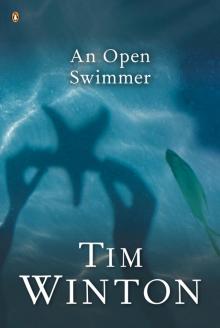 An Open Swimmer
An Open Swimmer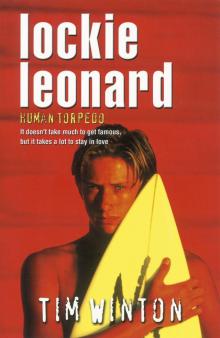 Human Torpedo
Human Torpedo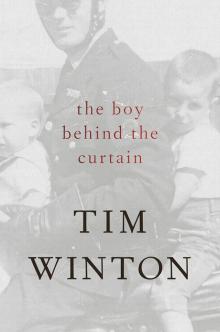 The Boy Behind the Curtain
The Boy Behind the Curtain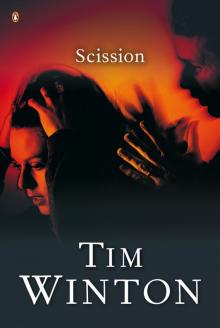 Scission
Scission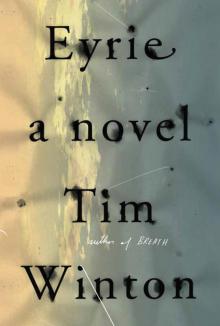 Eyrie
Eyrie Island Home
Island Home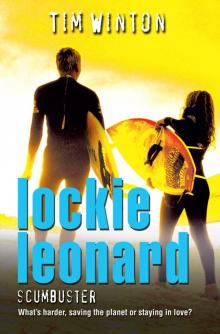 Scumbuster
Scumbuster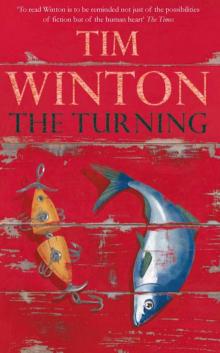 The Turning
The Turning Legend
Legend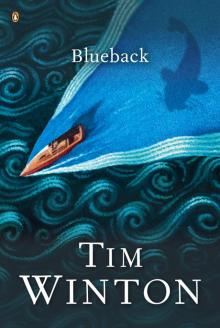 Blueback
Blueback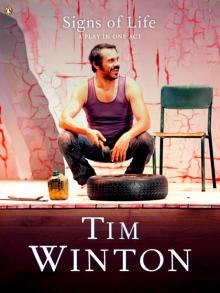 Signs of Life
Signs of Life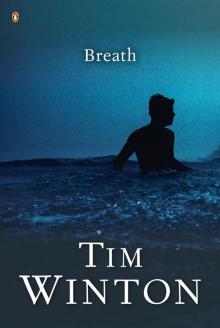 Breath
Breath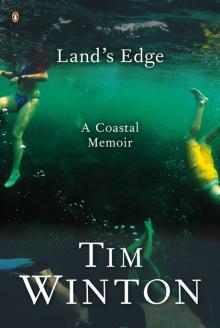 Land's Edge
Land's Edge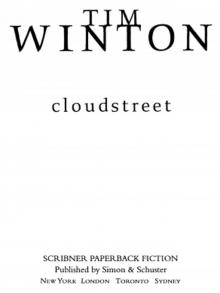 Cloudstreet
Cloudstreet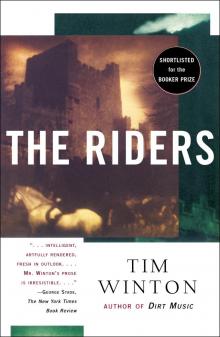 The Riders
The Riders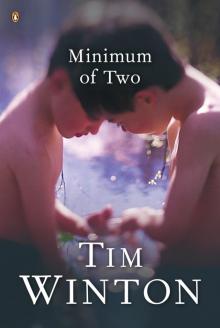 Minimum of Two
Minimum of Two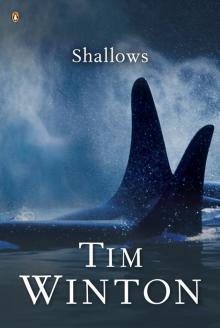 Shallows
Shallows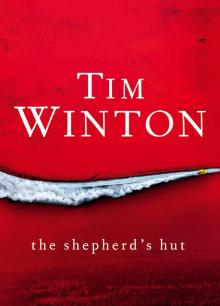 The Shepherd's Hut
The Shepherd's Hut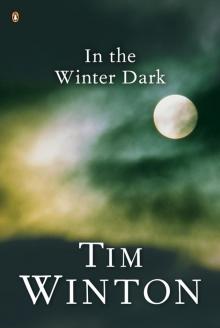 In the Winter Dark
In the Winter Dark